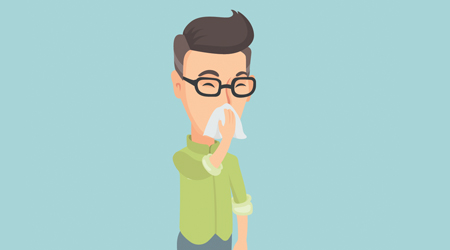
As cold and flu season approaches, some cleaning departments may need to ramp up their cleaning efforts — and take their cue from healthcare facilities that already have stringent programs in place to prevent the spread of germs. As Green points out, “if we can kill C.diff, we can kill anything.”
Hicks advises cleaning departments to increase cleaning and disinfecting of high-touch surfaces, particularly in public areas, during cold and flu season. For instance, elevator buttons, as well as coffee pots and microwave door handles in break rooms, are commonly touched areas susceptible to contamination.
“Up the frequencies [of surface cleaning] and make disinfectant wipes with a rhinovirus kill claim more readily available to people so that they can continue that disinfection service after the cleaning crew has been there,” adds Hicks.
Fairchild Medical Center does just that.
“We increase cleaning of high-touch points in the waiting rooms, and infection control sends out a memo to all staff members to wipe their phones between each use,” says Thomas. Staff are also reminded to wash their hands and are encouraged to keep their hands off their faces.
In addition to the above, cleaning personnel should educate staff to stay away from people who are sick whenever possible, and get a flu vaccine.
“Do not come to work when ill, so as to avoid exposing coworkers to illness that is easily transmissible,” says Allen. “And when ill, avoid close contact with others such as hugging, kissing or shaking hands.”
Avoiding contact with people who have a cold may seem like a no-brainer, but all too often, people continue coming to work when they are sick.
“Some companies have absenteeism policies that are punitive,” says Hicks. “People are afraid of losing their jobs, so they come to work sick and try to tough it out. We should have policies that allow them to stay home, rather than infect other people.”
Other facilities, like Howard Center, are ahead of the curve. In winter, the organization puts up posters encouraging staff to stay home if they experience flu-like symptoms.
Along with preventative measures, facilities need to focus on training custodial staff so that they understand what infections are and how they are spread.
“If the staff doesn’t have the right knowledge or equipment to clean daily, they can become a source of spreading infections,” notes Green. “Our goal is to clean every room and every surface right the first time. If they miss one surface, it can cause a problem. We are the front line in stopping the spread of infection. So our goal is to train, monitor, audit and ask questions of our workers to ensure they’re doing it right the first time.”
Five Facts About Rhinovirus
• The “rhino” in rhinovirus is derived from the Greek word for “nose”
• Rhinoviruses can cause up to 40 percent of all colds
• Rhinovirus can reproduce efficiently in cool temperatures found inside the nose
• Antibiotics cannot cure a cold
• There is no vaccine against rhinovirus
KASSANDRA KANIA is a freelance writer based in Charlotte, North Carolina.
Hand Hygiene Rules For Controlling Infections

 Celebrating BSCAI's 60th Anniversary eBook
Celebrating BSCAI's 60th Anniversary eBook The Down and Dirty on Cleaning in Virus Season
The Down and Dirty on Cleaning in Virus Season How Surfactant Use is Expanding in Commercial Cleaning
How Surfactant Use is Expanding in Commercial Cleaning